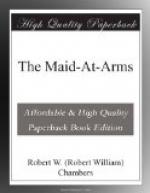There was no mark on the blue surface. I picked up an ink-horn, sniffed it, and spilled a drop of the fluid on my finger. The fluid left no stain, but the odor I had noticed certainly came from it. I folded the paper and placed it in my beaded pouch, then descended the stairs, to find Mount stirring the corn-bread and Sir George laying a cloth over the kitchen table, while Beacraft sat moodily by the window, watching everybody askance. The fire needed mending and I used the bellows. And, as I knelt there on the hearth, I saw a milky white stain slowly spread over the finger which I had dipped into the ink-horn. I walked to the door and stood in the cool morning air. Slowly the white stain disappeared.
“Mount,” I said, sharply, “you and Murphy and Beacraft will eat your breakfast at once—and be quick about it.” And I motioned Murphy into the house and sat down on an old plough to wait.
Through the open door I could see the two big riflemen plying spoon and knife, while Beacraft picked furtively at his johnny-cake, eyes travelling restlessly from Mount to Murphy, from Sir George to the wooden stairway.
My riflemen ate like hounds after a chase, tipping their porridge-dishes to scrape them clean, then bolted eggs and smoking corn-bread in a trice, and rose, taking Beacraft with them to the doorway.
“Fill your pipes, lads,” I said. “Sit out in the sun yonder. Mr. Beacraft may have some excellent stories to tell you.”
“I must do my work,” said Beacraft, angrily, but Mount and Murphy each took an arm and led the unwilling man across the strip of potato-hills to a grassy knoll under a big oak, from whence a view of the house and clearing could be obtained. When I entered the house again, Sir George was busy removing soiled plates and arranging covers for three; and I sat down close to the fire, drawing the square of blue paper from my pouch and spreading it to the blaze. When it was piping hot I laid it upon my knees and examined the design. What I had before me was a well-drawn map of the Kingsland district, made in white outline, showing trails and distances between farms. And, out of fifty farms marked, forty-three bore the word “Rebel,” and were ornamented by little red hatchets.
Also, to every house was affixed the number, sex, and age of its inhabitants, even down to the three-months babe in the cradle, the number of cattle, the amount of grain in the barns.
Further, the Kingsland district of the county was divided into three sections, the first marked “McCraw’s Operations,” the second “Butler and Indians,” the third “St. Leger’s Indians and Royal Greens.” The paper was signed by Uriah Beacraft.
After a few moments I folded this carefully prepared plan for deliberate and wholesale murder and placed it in my wallet.
Sir George looked up at me with a question in his eyes. I nodded, saying: “We have enough to arrest Beacraft. If you cannot persuade Magdalen Brant, we must arrest her, too. You had best use all your art, Sir George.”




